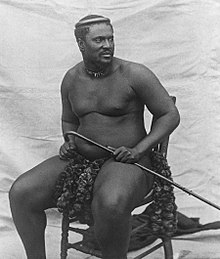Battle of Ndondakusuka
| Battle of Ndondakusuka | |||||||
|---|---|---|---|---|---|---|---|
| Part of Zulu Civil War | |||||||
 Cetshwayo, the battle's victor |
|||||||
|
|||||||
| Belligerents | |||||||
| Cetshwayo faction (uSuthu) | Mbuyazi faction (iziGqoza) | ||||||
| Commanders and leaders | |||||||
| Cetshwayo | Mbuyazi; John Robert Dunn | ||||||
| Strength | |||||||
| c.20,000 | c.7,000 | ||||||
| Casualties and losses | |||||||
| unknown | over 20,000 (including non-combatants) | ||||||
The Battle of Ndondakusuka (2 December, 1856) was the culmination of a succession struggle in the Zulu kingdom between Cetshwayo and Mbuyazi, the two eldest sons of the king Mpande. The latter was defeated at the battle and was killed, leaving Cetshwayo in de facto control of the kingdom, though his father remained king. All of Mbuyazi's followers were massacred in the aftermath of the battle, including five other sons of the king.
Cetshwayo was the eldest son of the King Mpande kaSenzangakhona. Many of the izikhulu supported Cetshwayo but Mpande favoured his next eldest son Mbuyazi. Previous kings had succeeded to the throne through bloody means and Mpande’s successor would face the same trial.
Mbuyazi was Mpande’s second son by a widow of the great Zulu king Shaka. The higher status was Mpande’s justification that the elder Cetshwayo should be bypassed. At a sacrifice of an ox, the point was made known when Mpande ordered that the shields to be made from the hide would have the best side used for Mbuyazi. An induna pointed out to Mpande that this meant he was renouncing Cetshwayo as rightful heir. Mpande retorted that when he was a commoner he had fathered Mbuyazi on the behalf of Shaka and that now as king the significance of that birth would be recognized by being Mpande's successor. The public consequences of that action were realized when Mpande ordered Mbuyazi to move his supporters, the iziGqoza faction, to the south of the Mhlatuze River, the area that as the first son had been occupied by Cetshwayo and his followers, the uSuthu faction. Cetshwayo believed that it was the time to act decisively and mobilised his forces. He intended to remove this threat to his succession to the Zulu kingship.
Mbuyazi had far fewer supporters than Cetshwayo. On the advice of his father, he sought help from white settlers in Natal led by John Dunn. Dunn gathered a small group of 35 Natal Border Police and an additional force of 100 native hunters. Mbuyazi's own forces totaled 7,000 warriors. Cetshwayo was seen by many as the rightful heir, so warriors flocked to his support, which numbered between 15,000 and 20,000 men. The guns of the colonials could only help Mbuyazi up to a point, as their numbers were too few to overcome such a large enemy force, but he was not discouraged. Mbuyuzi remembered that Mpande's general Nongalaza had overcome a superior force during the Battle of Maqongqo against Dingane. Nongalaza himself joined Mbuyazi at Mpande's request.
...
Wikipedia
